
a treasure-trove of literature
treasure found hidden with no evidence of ownership
(and our other authors) or get HELP Reading, Downloading and Converting files)
or
SEARCH the entire site with Google Site Search
 |
Project Gutenberg
Australia a treasure-trove of literature treasure found hidden with no evidence of ownership |
BROWSE the site for other works by this author (and our other authors) or get HELP Reading, Downloading and Converting files) or SEARCH the entire site with Google Site Search |
Title: Jaragu and the Lost Islands Author: Rex Beach * A Project Gutenberg of Australia eBook * eBook No.: 1900421h.html Language: English Date first posted: April 2019 Most recent update: April 2019 This eBook was produced by: Walter Moore Project Gutenberg of Australia eBooks are created from printed editions which are in the public domain in Australia, unless a copyright notice is included. We do NOT keep any eBooks in compliance with a particular paper edition. Copyright laws are changing all over the world. Be sure to check the copyright laws for your country before downloading or redistributing this file. This eBook is made available at no cost and with almost no restrictions whatsoever. You may copy it, give it away or re-use it under the terms of the Project Gutenberg Australia Licence which may be viewed online.
GO TO Project Gutenberg Australia HOME PAGE

Transcriber’s Notes: This story was serialized in Crackajack Funnies (a comic book) #4, September 1938 through #8, January 1939. Chapter headings are left as they appeared in the original. The Table of Contents points to the beginning of each month’s installment.
September 1938
October 1938
November 1938
December 1938
January 1939
Chapter I
Sparkling foam curled back from the Schooner Maya’s bow. Burying her nose now and then in the long, rolling swell of the blue Pacific, the trim craft headed south along the Central American coastline, bound for Panama. And standing together at the bow, their faces half-lighted by the early morning sun, were three men—as oddly assorted a trio as ever sailed aboard the Maya.
Broad and husky, mahogany-tanned by tropic suns and with the small-lined face that bespeaks an aviator, Captain Bill Adams shifted his glance from one to the other of his two companions. One was a burly, almost roly-poly darky, whose white teeth gleamed through a broad-lipped grin of pleasure.
The third of the group was Jaragu—Jaragu of the Jungle. Lithe, his body swaying rhythmically with the toss of the boat, head erect and eyes searching the far reaches of the sea, Jaragu of the Jungle was speaking without looking at his friends:
“I wonder what the big cities will be like—life in civilization?” he asked, half to himself. “You, Captain Bill, and Sunshine, rescued me from the jungle tribe that reared me. I shall have to stay close when we reach your New York because I know nothing of—of white men’s ways.”
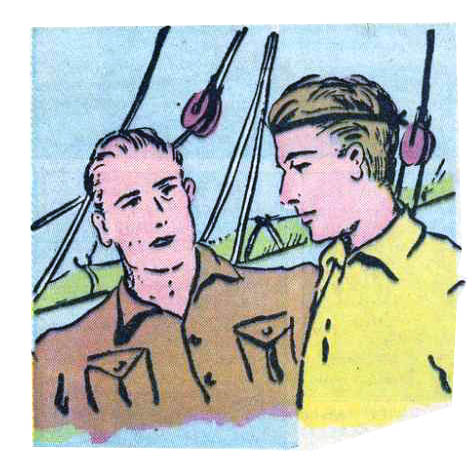
He said the last a little sadly and Captain Bill Adam’s face instantly reflected the gentleness that lay behind his hard and knowing eyes.
“Don’t worry, Jaragu,” the aviator-adventurer said softly. “Together we three came out of the jungle after Sunshine and I cracked up in my plane. That we found you with the savages who murdered your parents and then brought you up as an Indian was fortunate for all of us, for without you Sunshine and I never would be here today, heading for Panama and a steamer home.
“Don’t worry about New York, boy. We’ll stick together, the three of us. Just remember that your mother and father, before they died in the jungle, came from the United States and that you’re going back to your rightful place.”
They were silent for a moment until Sunshine, his eyes rolling white, began to draw in deep breaths of the sea air. A troubled frown spread over his usually beaming countenance.
‘Cap’n Bill,” he said. “I’s smell trouble in dat wind.”
Captain Bill threw a quick glance at the horizon. He half-nodded and with a brief “Wait a minute,” headed for the Maya’s bridge. Inside the bridge-house, Captain Hutchins of the Maya greeted Bill Adams with a worried smile.
“You’ve guessed it, from the look on your face,” the Maya’s skipper said.
“Hurricane.”
Captain Bill’s single word was both a statement and a question. For answer, Hutchins nodded his head toward the barometer. “Droppin’ like a harpooned whale soundin’ for bottom,” he admitted. “Looks like a blow.”
They looked out again at the sea. Rolling gently a few moments before, now the Pacific’s swell seemed more powerful, seemed packed with overhanging trouble.
The same feeling was in the air. Where there had been a slight but cool breeze before, now there was only the deadly, ominous stillness that to the experienced navigator bespeaks the sudden storm.
“Can you run for it? Make some other port if the hurricane is going to strike before we reach Panama?” Captain Bill asked.
Hutchins’ only answer was a gloomy shaking of his head. With a quick glance which showed him that the schooner’s auxiliary engines must be getting ready for duty—the engine room telegraph was set to “Stand By”—Captain Bill left the bridge and returned to his companions.
“Storm,” he said tersely. “We’d better get below-decks soon. Make sure you know where your life-belt is, Sunshine. I’ll handle Jaragu’s for him; he’s never seen one, naturally.”
About the deck, the Maya’s scant crew was bustling to the terse orders of the mate, battening down hatches, lashing fast the spars and loose fittings. With a roar of ropes and canvas, the big mains’l came clattering to deck. Only enough canvas was left aloft to keep the Maya sailing well. Even Jaragu, knowing nothing of the sea, could understand by the tense attitude of the seamen that they were in for a real battle with the onrushing storm.
That there was a storm roaring toward them no longer was in doubt. The deadly calm still prevailed, but in the south-western sky ugly black clouds, piling one upon the other high into the heavens, had replaced the hazy blue. From far off, almost too faint for believing, came a faint, insistent whisper.
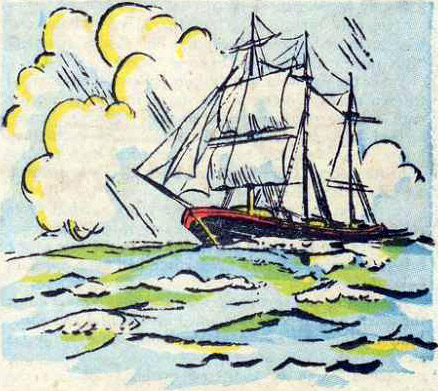
“Tropical hurricane. Looks worse than any I ever saw,” Captain Bill commented. “We’re in for trouble.”
Abruptly the sea, until now comparatively quiet, began to lift each curling roller a little higher, began to slap the foam a little higher against the Maya’s bow. From the horizon line, rushing toward them, a seemingly endless strip of white water raced atop the blue swells.
There was another little moment of silence.
Swiftly then, with a suddenness that sent every man scurrying for the hatchway to below-decks, the storm struck.
There was a mighty scream of the hurricane’s might as the vanguard of the gale snarled through the ships rigging. The black clouds galloped overhead and in a brief, blinding second loosed upon the Maya a torrent of driving, smashing rain. The racing strip of foam came closer and as they rushed for shelter the men saw that the foam was an endless wave of roaring, smashing might, curling high above the decks before it struck.
With a smashing blow that shivered every last timber of the stout little schooner, the hurricane arrived.
And with that innate sense of vision acquired by his wild life in the Central American jungle, Jaragu knew instinctively that the Maya was doomed.
Chapter II
All day the hurricane stormed at the hatches of the schooner Maya. Endlessly the giant waves lifted themselves high above the vessel, then crashed upon the decks. There was no standing in the quarters below decks. Men grabbed at what they could to keep themselves from being battered to death within their own vessel. Swaying, pitching, tossing about like a straw in a whirlpool, the Maya fought the storm.
Grouped together, helping one another stay upright, Captain Bill, Sunshine, and Jaragu of the Jungle waited with calm expressions for what seemed inevitable—the breaking-up of the schooner.

Sunshine had been afraid at first. The fear of the enemy he could not fight showed in his white rolling eyes. Then the calm bravery of his hero, Cap’n Bill, inspired the dusky Sunshine. Too, he saw Jaragu, knowing naught of ships and the sea, meet the impending disaster with unwincing courage. And Sunshine found in his friends the strength to be brave with them.
“Sho—sho is a little rough!” Sunshine grunted, trying to chuckle at his own effort at levity. Captain Bill laughed encouragingly. Jaragu smiled.
“We’ll make it,” Captain Bill answered with forced cheerfulness. No one denied him. His companions as well as the members of the crew knew that Bill Adams was speaking only from courage, not from his convictions.’
“That gold we brought out of the jungle—from my lost mine—won’t do us much good now,” Jaragu remarked, his words coming slowly as he searched through his meager knowledge of the mother tongue he had only just begun to use.
“No, only the stout hull of the Maya and the sea wise brain of Captain Hutchins.” Bill Adams admitted “But there’s a chance—a fighting chance.”
Yet as the day went past and stormy afternoon changed to even, stormier night, as the storm, instead of abating with evening grew wilder, even that “fighting chance” seemed hopeless. Only by the ship’s clock could they know when night had come for there had been no daylight for hours. The hurricane’s black clouds had driven the day before them.
At the far end of the cabin there was a sudden, fierce rush of driving wind and rain. Every man in the room leaped for the hatchway which led up to the foot of the bridge stairway. If that hatch-cover had been stove in—!
But sliding and sprawling, a human figure came down the hatch, and the cover slammed shut behind and above him, making the sound of the storm once again far away.
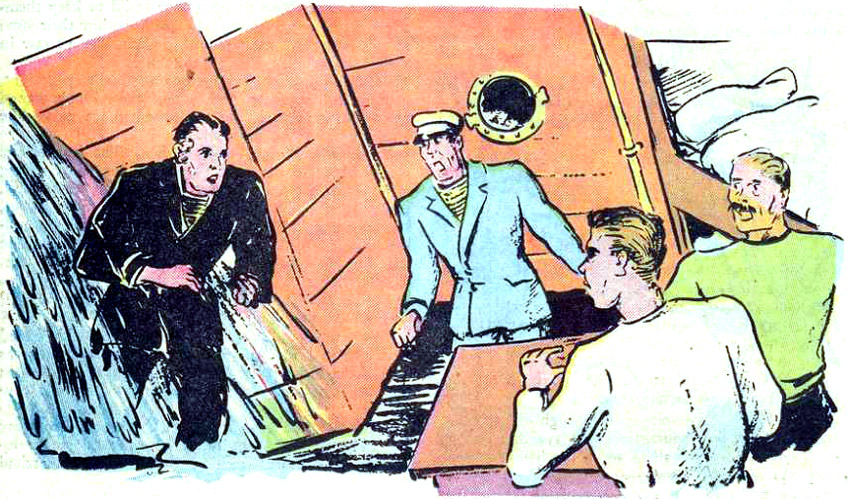
“Sparks!” one of the crew gasped. “What’s the matter?”
The man who had just come down the companion way, lurched to his feet. There was a taut, almost wild expression in his eyes. He coughed up a mouthful of salt water and gasped out a sudden and chilling message:
“Stand by . . . Man the pumps . . the skipper says. Mate reported three feet water in the hold . . . risin’ fast!”
The radio man. Sparks, was out of breath.
As the crew members turned, heading for the bulkhead door that led to the hold, the radio man added: “Storm got the antenna . . . of the radio . . . tore it away. Couldn’t send out our position before the set went blooey! Looks bad.”
With a weary shake of his head, Sparks turned and braced himself a moment before hurling himself back outside in an effort to regain the bridge. At the other end of the cabin, the crew hurried to man the pumps. Water in the hold! And rising! That meant already the hurricane had sprung some of the Maya’s seams!
Jaragu and Sunshine looked to Captain Bill.
“All right, boys,” he said quietly. “That sounds like a job for us. Come on—we’re going to take our turn at the pumps!”
At first knee-deep in the swirling, brackish water, every man took his turn working the hand pumps.
“Engines flooded out,” the first mate explained simply. “Gotta pump by hand or else—” He did not finish. It wasn’t necessary.
Side by side now, with every man needed on the pumps to keep the water from flooding the hold, Jaragu, Captain Bill, and Sunshine worked with the crew. Backs ached and muscles seemed worked beyond human endurance. Yet they knew that to live they must pump. Courageously they fought to hold back the sea.
Suddenly, echoing through the vessel’s whole hull, came a sharp, heavy hammering. Captain Bill looked up quickly but the mate spoke before him:
“We’re lost! That’s the propeller shaft . . . it’s busted or else burned out the bearings!”
A rising babel of shouts filled the hold. Above the noise came the abrupt, piercing sound of a boatswain’s whistle.
“All hands on deck! All ha-a-ands on deck!”
The boatswain’s voice cut through the confused murmur.
“That means we’re going to abandon ship!” Captain Bill said in a low urgent voice to his two friends. “Grab your life preservers and remember this—stick together!”
“Yassuh, Cap’n Bill,” came Sunshine’s reply. “Us sticks togaithah o’ us is stuck. Yassuh.”
Even in the tenseness of the emergency. Captain Bill found time to chuckle. Jaragu, with the calm bravery he had learned in the jungle, was ready for anything, ready to do anything Captain Bill ordered.
The three started toward the companionway.
But almost before the echo of the boatswain’s whistle had died away, the Maya’s hold was transformed into a shrieking, shouting madhouse of panic-stricken men!
Their own peril suddenly dawning on them with the boatswain’s words, the crew of the Maya lost all sense of discipline. With one mad roar they rushed for the companionway, fighting, shouting, jamming against the flight of steps leading above decks.
The tossing of the ship, the odd flicker of lights as the dynamos, power cut off with the stopping of the engines, slowed down and lost their power—all contributed to the frenzied panic.
Swiftly Captain Bill Adams acted. With one sweep of his arm he jammed Jaragu and Sunshine back into a corner. Plunging forward, like an arrow into a bale of tangled straw, Captain Bill fought his way to the companionway. Two men—the first two—were struggling to climb up, fighting to escape the panicky clutch of the others who sought to be first out of the hold of the sinking ship.
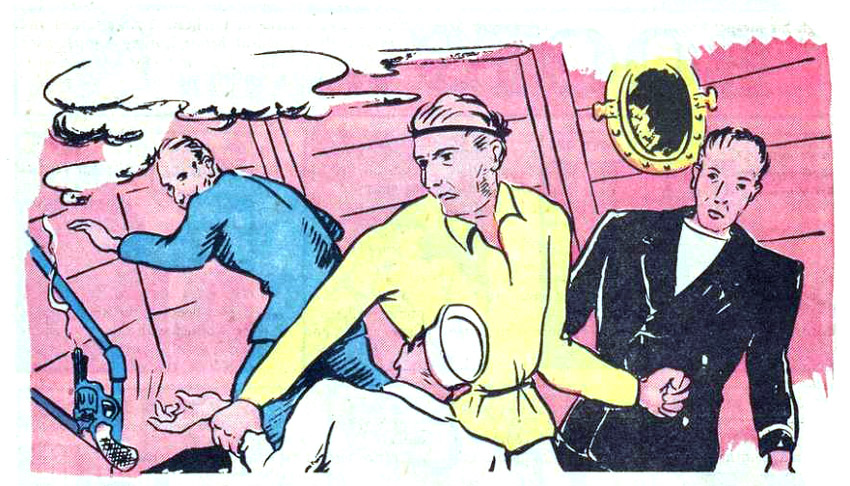
Without a word. Captain Bill smashed out with a hard jarring left. It caught the foremost of the mob flush on the jaw and the seaman was driven backwards against the others. There was a moment of astonished calm and Captain Bill seized that moment, knowing he would not have a second chance.
“Men! Men!” His voice cut through their terror. “Stop it! Find your courage! The Maya isn’t sinking yet. There is time for all to reach the lifeboats. Stop Acting like cowards. Remember you’re—”
Captain Bill didn’t get a chance to finish.
A shadowy shape suddenly hurtled across the hold, flung itself in a long, swift dive upon one of the seamen at the rear of the mob.
A gun barked and lead thudded into the timbers of the bulkhead. There was a swift scurry, the crack of knuckles smashing home on a jawbone. And then a figure arose—Jaragu of the Jungle!
At his feet stretched an evil-faced seaman, his wrist twisted in a weird position that bespoke broken bones. By the fallen man’s side was a revolver. In the silence, Jaragu stood at full stature his lithe body tensed and ready for more trouble. Calmly he eyed the mob, stared each man down, then spoke:
“Now you will listen,” Jaragu said. “Listen to Captain Bill.”
There was a firm, steady ring to his voice; there was a note of authority to which the form of an unconscious seaman lent added weight. Swiftly, as it will with mobs, the panic left the men. And sensing it, Captain Bill smiled.
“All right, men,” he laughed. “Let’s all go up—and slow. Go ahead there, you. You’re first. Next. Next. Go on. Keep moving.”
Swiftly, but orderly now, the hold was emptied. Men, panic-stricken a moment before, poured up the companion way to the deck, grabbing the handlines as they went up to keep their balance against the toss of the sea. Finally there were left only Sunshine, Jaragu, and Captain Bill. Bill shoved Sunshine toward the steps, placed a fond grip on Jaragu’s shoulder.
“Thanks, son,” Captain Bill said. “He’d have gotten me if it hadn’t been for you”
“That was nothing,” came the answer in halting English. “I have much to repay you.”
Together then they turned to face the storm on deck, each knowing that in the other he had more than a friend.
Chapter IV
On the Maya’s deck, they found that in the battle with the storm they had lost all sense of time. Now it was night. Black night enveloped them, lighted only by the feeble, rain-hidden glare of sea lights. Rain pounded down on them. The waves smashed harder still against the schooner, yet the boat seemed to ride less unevenly in the water. Captain Bill noticed that and knew why:
The hold was filling so fast that the inrushing sea itself acted as ballast, weighing the light schooner down, making it more seaworthy—for a little while, until the moment should come when the weight of water in the hold was too great, when one final wave should smash across the Maya’s decks and she would dive, with the swift, rearing plunge of a stricken thing, into the sea.
“All hands stand by to abandon ship!”
The Maya’s commander shouted the command from mid-deck, waving a lantern above his head.
The boatswain’s whistle piped again, this time its shrillness lost in the scream of the wind. With trained speed, the crew moved to its stations at the three lifeboats, which seemed so frail in comparison with the booming waves which were curling aboard. Moving together, the three friends found themselves at the gunwales of the third boat. Already the first, commanded by the mate was ready to lower away. There was a little delay as a squad of seamen, commanded by the skipper, smashed open and dumped barrel after barrel of engine oil over the lee side, away from the wind.
“Makes the sea’s surface a little calmer,” Captain Bill explained to Jaragu’s questioning look. “Now they’ll lower the boat.”
He was right. With a squeaking of windlass pulleys, the number one lifeboat dropped over the side into the boiling sea.

A horrified gasp went up from the men lined along the rail. Almost touching the sea, the number one boat had fouled its lines. The bow line from the davits snarled, held fast. The stern line kept paying out, letting the stern down first. For a moment those in the boat held onto anything. Then a lurch of the ship jerked the little boat like a toy on a string and with shrieks lost in the roar of the storm, the entire boatload was catapulted into the ocean.
“Lower away Number Two!”
The Captain’s order sent the second boatload over and down the side with shrilling pulleys.
“Not a chance to save them!” Captain Bill thought and then moved with speed, as the order was given for the third and last boat, in which the vessel’s commander was the last to clamber, to “Lower away!”
Abruptly the pulleys let them down. Without a hitch they dropped to the surface and those on the side nearest the Maya gave a final lunge against the schooner’s hull to clear the lifeboat.
“Oars!” Captain Hutchins barked. Men seized the long sea oars. “Row!” came the command and they swung into rhythmic sweeping, driving the little lifeboat out and away from the sinking ship; out, too, into the grip of the storm.
Almost alongside, the number two lifeboat was searching for any possible survivors of the capsized first craft.
“Not a chance!” the Maya’s commander bellowed through his cupped hands. “We’ll search a little more, then try and let a course due east . . . coastline . . . reefs . . .”
Even to Captain Bill and his two companions up in the bow of the lifeboat, the commander’s words were partially lost as the wind snatched the phrases away in hollow echoes.
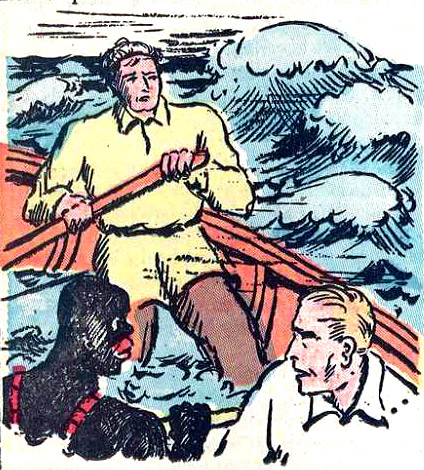
A driving squall of wind and rain blotted out view of the other boat and forced the seamen to labor with all their might to keep the boat riding with the wind. The search for the lost men of the first ship’s boat was fruitless and futile. Buffeted by the storm as soon as they were driven from the lee of the Maya, the survivors found it almost impossible to maneuver their craft in the circles necessary to cover the area in which the capsized boat had hurled its occupants. With a weary, half-beaten sigh, Captain Hutchins of the Maya gave the order to row due east, heading for land through the mountainous seas. It seemed an almost hopeless task, but while they lived they would fight for the coast
* * * * * * *
The night hours stretched out interminably. Once they thought they saw a capsized lifeboat drifting near them. “The number two boat!” a seaman gasped. But wind and seas shut out their vision and none could be sure that the second boat actually had overturned.
Rowing in shifts, Captain Bill and Jaragu found themselves side by side, with Sunshine in the next seat toward the stern. Now they found time to think back on the experiences of the night. With a sinking feeling, Captain Bill realized that their precious gold was back there on the Maya, and perhaps already had gone to the watery depths of Davy Jones’ locker. For himself, it made no difference. But he had counted on that gold—taken from the jungle cache where Jaragu’s folks had hidden it before the jungle and Indians brought them down—to help educate Jaragu, to help make him accustomed to the ways and life of civilized white men with whom the jungle lad really belonged by birthright.
“Cap’n! Cap’n Bill!”
Sunshine’s hoarse whisper at his ear roused Bill Adams from his thoughts. He nodded his head.
“Cap’n, I’se found guns ’n’ stuff heah in this locker beneath wheah at I’se sittin’!” Sunshine whispered in excited tones.
But any comment Captain Bill might have had was lost in a commotion at the stern of the boat. Above a hubbub of voices they heard Hutchins dismayed: “The boat’s compass. Must’ve been smashed when we put over the side!”
With a little sinking feeling, Captain Bill knew what that meant—with their compass not functioning, these last hours of rowing may have been in entirely the wrong direction to reach land; or again, perhaps the wind had shifted while they rowed, and unable to judge its shifting through lack of a true compass, perhaps now they already had been driven far off a course, which would have taken them to somewhere on the Central American coastline.
Quietly, Captain Bill communicated his thoughts and fears to Sunshine and Jaragu. When he had finished, Jaragu spoke:
“We must be careful that no one else knows of the guns Sunshine found. Captain Hutchins must know of them. But perhaps the others do not. If we are long in this boat, if the men grow afraid, the guns might be bad for all.”
Captain Bill nodded and spoke again, almost unwillingly, but knowing that his friends should be forewarned of what they faced.
“Yes, Jaragu,” he said slowly, bending his head so that the seamen behind might not hear, “and the chances are that we are going to be in this little craft a long time—unless it sinks or upsets.
“It’s a desperately bleak coastline at best. And if by chance the storm has shifted since we left the Maya, we may be driven far from the coastline; if northward, all right, we shall be in the shipping lanes.”

He paused a moment, building up in his mind a picture of the waters in which they had been cast adrift “But if the storm shifted to the north,” Captain Bill went on, “then we may well be driven southward toward the northwestern coast of South America, perhaps to one of the desolate islands some three or four hundred miles offshore.
“But,” he added with a reassuring grin, “perhaps it won’t be as bad as all that; perhaps we’ll land right-side-up in Panama itself!”
Jaragu smiled. Sunshine tried to chuckle. The smile stayed on Captain Bill’s face. But each of them was simply trying to “carry on.” They knew that the frail little craft would do well to ride out the storm. They knew the Maya’s radio had gone out before an SOS and their position could be sent out.
They knew they must fight the sea, with all the odds against them!
Chapter V
All night they were swept along by the storm. Captain Hutchins kept the men rowing in shifts, so that the lifeboat would be kept before the wind and not in the troughs of the giant waves where it surely would have capsized. They were not going anywhere in particular; they couldn’t with an inaccurate compass. Their only hope was to ride out the storm, then try and figure out their position and direction from the sun when the storm cleared in the morning, or from stars when the night sky cleared.
But the following morning gave them little hope. The fury of the hurricane died out; the wind ceased its screaming and settled to a steady moaning blow that slammed the lifeboat along under good headway. The rain fell away to a drizzle but the sky, although it grew light, was too overcast for the sun to break through. There would be no bearings from the sun.
All that day they drifted with the wind. In the stern Captain Hutchins rationed out water from the one emergency cask. There were sea biscuits; two boxes of chocolate. Dividing the rations evenly and carefully, the Maya’s commander announced that there was enough to “keep us going for ten days, perhaps eleven.”
“But we will surely strike land somewhere before that time limit is up,” Hutchins said with forced cheerfulness.
They settled down to waiting, crouched together, huddled for the scant warmth of one another’s bodies, while the chill rain soaked them through and through. Occasionally they rowed vigorously for a while to restore some little warmth to their bodies. Of the other boat there was no sign.
Toward night the storm began to rise again, and although the rain was no greater, the wind and waves mounted to a higher pitch. Not long after darkness, Captain Bill felt a firm hand on his shoulder. He turned to find Captain Hutchins bending over him, whispering low:
“Rifles and ammunition in the locker beneath the seat behind you. In case of trouble or . . . or if anything happens to me, you guard those guns!” the ill-fated schooner’s commander ordered. Captain Bill nodded assent, and when Hutchins had gone, passed the advice to Jaragu and Sunshine.
Now the storm grew worse, waves climbing higher, each threatening to engulf the lifeboat until the little craft slid at the last moment to the top of the comber, only to rush down into the trough of the next wave and again face seemingly certain disaster.
They entered a second night of horror. Added to the fierceness of the storm was the mounting terror of some of the men in the boat. Certain these were their last hours, they began to shriek and curse, crying out to the howling storm for mercy and hearing their cries driven back to them by the relentless winds.
Amidships there was a scuffle, a scream and a splash. One despairing soul, driven from his right senses by the terror of the night, had hurled himself into the boiling sea and was lost from sight before a man could grab him.
“Listen, Jaragu,” Captain Bill commanded, his head tipped to one side as if he were straining to hear some far-off sound. “Your jungle-trained ears are better than mine. Do you hear a new note in the storm, sort of a deeper sound, like crashing rocks upon a mountain side or—”
Jaragu tipped his head, too, and nodded.
“—or waves breaking on rocky shore,” he finished for Captain Bill. “Yes, I hear it. It is not far away.”
“Fasten your life preservers, quickly!” Bill ordered Sunshine and Jaragu. “Captain Hutchins!” Bill called to the’ skipper.
But before the commander’s answer could come back, the noise grew loud enough for all the boat to hear. There was no mistaking it—the booming of giant waves upon a reef!
And the sound, even against the mighty wind, came from dead ahead!
Chapter VI
Disaster seemed to leap at the frail boat from out of the night. One moment there was only the wall of darkness and then all could see the faint iridescence of breaking waves on a reef, could hear the nerve-shattering booming rise higher and higher, seeming to fill the whole night with the sound of its power.
“Row! Row, men! Oars, all!”
Captain Hutchins’ command was a desperate cry for action. But it came too late.
Even as stout backs and arms bent swiftly to the task of driving the boat backward from the maelstrom of white water, a mammoth wave seized them in its grip, lifted them high above the foam!
“Don’t jump! Stay with the boat as long as you can! Then try to swim atop a comber . . . your only chance!”
Captain Bill had to shout to make the others hear him. There was time for nothing else.
One moment they hung, poised above the seething cauldron of wild water on the reef; the next, they were plunging down with the comber at lightning speed, racing full into destruction.
There was a ripping shock. A jagged hole appeared instantly in the port side of the boat. A saw-tooth edge of the reef had crippled them.
Another shock, this time heavier, jarring their swift rush to a half-halt. In the bow, where the three pals were stationed, they saw the frame of the craft smashed in to a blunt end. Water rushed through the broken bow. Yet before they had time to realize that this was the death-blow to their boat, they felt a last speeding surge, a tossing sensation, and then the world seemed to turn upside down as the lifeboat smashed into the jagged black barrier which reared above the foam!
“Cap’n! Cap’n! Hyah we go!”
Sunshine’s last shouted phrase rang in Bill Adams’ ears as he fought to keep a hold on the lifeboat’s gunwhale. Faintly above the din of the pounding surf he heard men scream, felt rather than saw the lifeboat ground to pieces on the rocks.
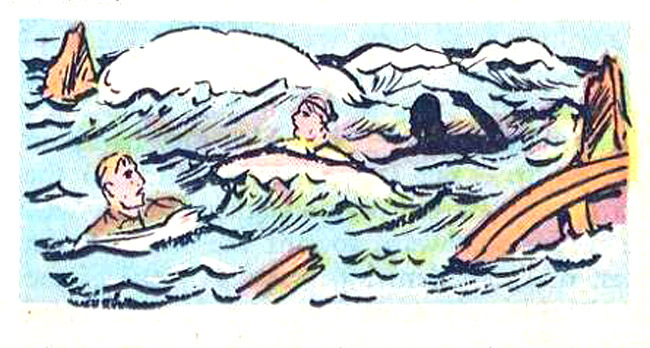
A wave slammed into them. Another and another. Mouths filled with spray, battered and hammered, men tried to stand against the sea and were beaten down. Gasping, fighting for life, Bill Adams felt a greater wave seize the boat in its grip, lift it high once more. Beneath and over the side he could see the tossing foam on the reef Perhaps beyond, there was quiet water. He hesitated a moment, then shouted, “Jump!” although he knew they could not hear him.
As the boat started to slide down the wave, straight down onto the reef this time, Captain Bill Adams launched himself over the side in a flat, slanting dive toward what he hoped would be safety. A split moment he was in the air. Salt spray flew up to meet him, slapped the wind from his lungs. A wave jarred every bone in his body. He had a vague feeling that Jaragu and Sunshine were alongside. Then the world seemed to go blank, and the black waves raced on past the black reef.
Bill Adams regained consciousness with the weird feeling that someone was beating him across the small of his back with a huge stick. Sick and weakened he tried to figure out what had happened. Salt water choked him and he grunted in disgust.
At once the beating on his back stopped. He felt someone turn him over until he was lying on his back. A familiar form loomed large above him.
“You have been close to the last council fire,” came Jaragu’s voice. Bill thought that one over for a moment until his still-befuddled mind told him that Jaragu was speaking in the parable of the jungle—meaning at the edge of the next world.
With an effort, Bill sat erect, realizing now that what he had thought to be pounding on his back had been Jaragu using artificial respiration to bring consciousness and life back into Captain Bill’s body. Again the jungle lad he had brought away from the vicious Indian tribe in Central America’s jungles had saved Bill Adams’ life.
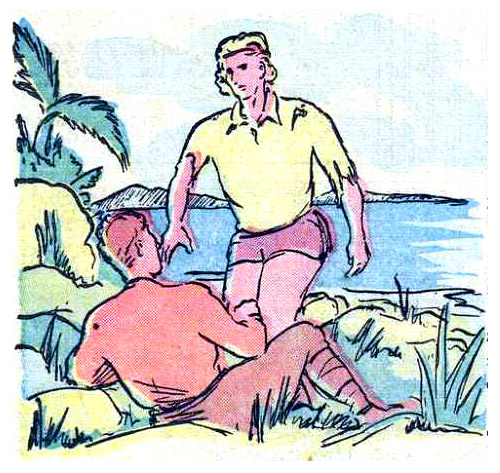
“But Sunshine?” he asked as he thought of his faithful dusky friend and helper.
“Right hyah, Cap’n! Yassuh, I’se just a-gittin’ rid ob de half ob dis ocean ah done swallowed!” came the laughable answer.
Bill struggled to his feet, swayed a moment as he held out his hand to Jaragu. “Thank you, Jaragu,” the soldier of fortune said steadily. “Someday I hope I can repay it.”
Jaragu grunted in confusion.
Now Bill took notice of those of his surroundings that he could make out through the flashes of lightning and occasional breaks in the storm. He could make out only that they were on a steeply-sloping beach, behind which loomed a bulky, straight-up-and-down cliff.
“Well, come on,” Captain Bill said finally, oppressed by the bleakness of their surroundings but nevertheless shaking off the effects of his half-drowning, “we’d better scout along the beach and look for the others.”
For a moment Jaragu and Sunshine were still. Sunshine spoke. “Ah—Ah guess dere ain’ no use in lookin’ for de res’ no mo’, Cap’n. Ah done walked mebbe half a mile up an’ down de beach while Jerry was a pumpin’ you dry ob salt water. An’ dere wan’t a soul! Ah know, cause Ah hollered an’ hollered.”
Jaragu nodded confirmation of Sunshine’s report. “I’m afraid they all were lost, Captain Bill,” he said.
“Well, if Sunshine’s covered the beach,” Bill agreed, “we may as well try and find shelter of some sort up there against the cliff. Perhaps a cave . . . or under some big rocks.”
Walking close together lest they be lost in the darkness, the three survivors made their way by lightning flashes to the base of the huge cliff. A few moments of search revealed half a dozen small caves, really only niches cut in the solid rock by the action of centuries of battering waves. Picking what happened to be the driest and least exposed, they crawled inside.
“Unless I lost them coming through the reef,” Captain Bill said as they groped in the darkness, “there’s a waterproof pack of matches in my pants pocket. Right! Here they are!” he finished triumphantly. A moment later came the yellow, cheery glow of a match. By its glare they saw a pile of small driftwood and dried seaweed farther back in the cave and although Captain Bill felt the flame singeing his fingers he managed to ignite the seaweed with the first match.
Feeding the driftwood, which was only a little wet by the in-driving rain, onto the seaweed, they soon had a fire going that brought the moisture steaming from their clothes, drove the chill from their tired bodies and heightened their morale.
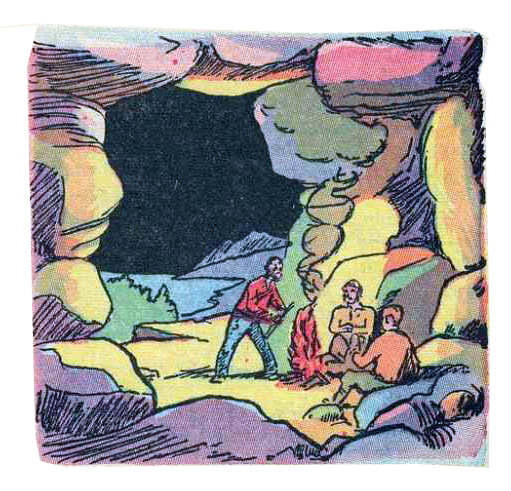
“For the time being, I guess, we’re safe,” Bill commented when they had warmed themselves. “In the morning we’ll look again for survivors and then try and figure out where we are.”
“Where do you think we’ve landed?” Jaragu asked.
“No telling,” Captain Bill answered slowly. “But here’s the way I figure it. If the wind had continued to blow from a westerly quarter after we left the Maya, by this time we should have been driven ashore on the Central American coast —somewhere. Maybe that’s where we are.
“On the other hand, if the wind shifted, as it might well have done yesterday during the lull between the two storms, we may be anywhere at all. So let’s not worry about it until morning. We’ll know soon enough.”
With that he curled himself in a dry corner of the cave and leaving the fire to burn itself out, the others followed suit.
For them it was well they had no idea of how long it would be before Captain Bill’s prophecy—“We’ll know soon enough”—would come true.
* * * * * * *
In the night the storm blew itself out and Captain Bill awoke to find a golden sun flooding their cave. For a moment he stretched luxuriously until his brow creased in a frown. Was this a morning sun or evening? The answer was important. Almost afraid to move he lay still, marking the edge of the shadow cast by the cave’s entrance, waiting to see whether it was a rising or a setting sun which filled the cave with warmth. Tense minutes passed and then he was sure: It was a rising sun, it was morning.
“And if it’s morning,” Captain Bill mused aloud, “that means this shoreline faces east And if this shoreline faces east, unless it does some amazing doubling about, it can’t be the western, coast of Central America!”
Springing to his feet he reached the opening of the cave, stepped out onto the beach and looked to one side then the other. The beach and cliff stretched in majestic gold and black, colored by the morning sun, for perhaps two hundred yards to his left, slightly less to his right.
“It’s not the mainland,” Bill thought “It must be an island.” He heard a step and turned to find Jaragu whose calm face showed no anxiety.
“You have been figuring out the directions, Captain Bill?” young Jerry asked. As Bill nodded, the Jungle youth spoke again. “We seem to be on the eastern coast of something; it couldn’t be the mainland, so it must be an island. Right?”
“Right,” Captain Bill agreed, “and furthermore, look.” He pointed out to sea. Beyond the after-swell of the storm, they could see a long, nearly flat body of land, perhaps half a mile from where they stood.
“Another island!” Jaragu exclaimed. “Perhaps—perhaps there are people here. A trading station. A coastwise port of call.”
“Perhaps,” Captain Bill agreed. “But we’ll wake Sunshine and go find out.”
Sunshine came crawling sleepily out of the cave to hear the surmises and plans of Jaragu and Captain Bill.
“Let’s work it this way,” suggested Bill. “We need food and drinking water. Jaragu, you know the ways of the wilds better than we; suppose you start north along the beach and work inland as soon as you find a break or a path on the cliff. Sunshine, you go north with him, but keep on along the beach if Jaragu goes inland. I’ll head south. We’ll look for nuts, berries and water. And, of course, signs of humans. We meet back here when the sun is overhead. Right?”
Agreeing, all three started out on their missions.
* * * * * * *
Captain Bill had gone about two hundred yards down the beach, finding it curved gradually until the point from where they had started was lost to view. He stopped once, coming upon a few splintered boards washed high on the beach—perhaps wreckage of the Maya’s lifeboat Now he was certain they were on an island, for the shoreline seemed to be swinging in a large and irregular circle.
An island, Bill thought as he moved along, scanning the steep face of the cliff for a way up. “Not very large, either. From the way the shore curves, I’d say it’s hardly a mile in length overall and certainly much less in width.”
Now he had come to a sort of gully, where the cliff had been washed out and the bed of a tumbling stream sloped upward gradually for about a hundred yards to the top and what apparently was a miniature plateau forming the center of the island. Leaving his course on the beach, Captain Bill started climbing, finding green clumps of grass growing along the stream, with here and there a bush of wild berries whose location he marked in his mind.
At the top of the gully Bill Adams halted with surprise to take in the scene before him. Tall cocoanut palms climbed up from a grassy, partially wooded plateau. Almost at his feet a bird flew up swiftly. “Food,” he thought “And the stream for water.”
The thought recalled to his mind that he was thirsty. Bending over the stream he drank slowly of the cold, crystal water. He drew back a little, then, every muscle in his body seemed to contract with apprehension. He felt the hair rising on the back of his neck, felt little beads of sweat form on his brow.
Reflected in the brilliant surface of the little stream was a horrible figure—a gigantic black man, face smeared with crimson streaks! And Captain Bill saw that the man was standing directly in back of him, one brawny upraised arm poised with a ready spear!
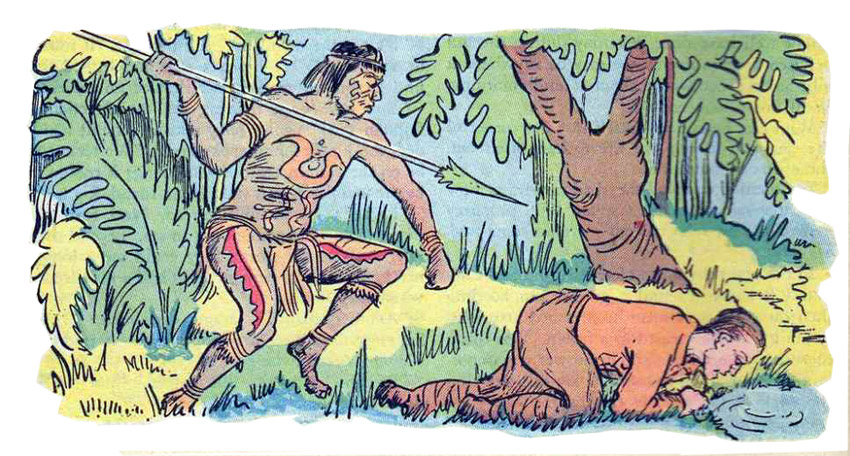
Bill Adams was sure his time had come!
Captain Bill’s first thought, upon seeing the awesome reflection in the water, was to turn and try to establish the fact he was unarmed, that he was friendly. Some inner hunch, however, made him doubt his ability to put those thoughts across before that poised spear would come driving down. His mind cool as ice, Bill swiftly launched himself into the only maneuver which might give him a chance. His feet had been drawn up under him when he bent to drink.
Now, instead of trying to turn backward toward the savage black man, his muscles tensed and Bill drove himself forward and away from the figure standing over him.
Clearing the brook, Bill had no more than touched the opposite bank than he threw himself sideways, rolling among the rocks.
It was well he had; for where Bill had first landed, he saw the quivering shaft of the savage’s spear, imbedded in the gravel of the bank! Bill drew himself to his feet in time to meet the driving charge of the black man who now threw himself upon Bill, a wicked stone knife flashing in hand!
Bracing himself, Bill met the other’s charge, grabbed with a grip of iron the savage’s knife arm. They crashed to the ground. Twisting his legs in a jiu-jitsu trick, Bill threw his attacker beneath him, then began to twist the knife wrist. The black shrieked in pain. For a moment Bill had the fleeting thought that the savage’s shrieks might bring help.
He heard a movement behind him, started to turn but was too late Something crashed down on his skull and Captain Bill Adams knew no more!
* * * * * *
Hours later, it seemed, Bill opened his eyes slowly. His head throbbed painfully. He tried to reach his hand upward but found both arms were bound tightly behind his back. Gradually, he made out that he was in the gloomy semi-darkness of a thatched hut. He tried to raise his legs and found they, too, had been lashed together by some sort of fibery vine. With an effort, Bill rolled his head to one side There was another form next to him. A moment of intense staring and he recognized it.
“Sunshine!” Bill exclaimed.
The form moved and Bill heard Sunshine’s dazed, but ready, words “Yassuh, Cap’n Bill. Dat you? Ah didn’ know rightly who ’twas an wa’n’t gwine t’ask account’n’ mebbe them tough colored fellahs gwine bust mah skull, ah guess.”
With a grin, in spite of his aching head, Bill Adams thought for a moment how many times the seriousness of their danger had been lightened by Sunshine’s drolly accented comments. “When did they get you, Sunshine?”
“Must’ve been after you, Cap’n Bill,” the other replied. “You was hyah, straitched out col’, when dey brought me in. Looks like dey might be cousins o’ mine, but dey don’ fight like it. Nossuh!”
Captain Bill grinned again, in spite of the seriousness of their position.
“Jaragu?” he asked briefly.
“Ain’ seed him, Cap’n Bill. Mebbe dat jungle boy too smart fo’ dese pugnacious gents.”
“A slim hope,” Bill Adams told himself. “If Jaragu’s loose, he may be able to help us. If not, then we’re done.”
Through his mind, although he said nothing aloud to frighten Sunshine, were racing thoughts of where they might be. West-north-west of South America’s northwesterly coast, Bill knew, were scores of islands, charted only vaguely on the best of marine maps. Many of them, having been sighted and plotted once, had seldom if ever been visited by white men. There were legends that man-eating cannibals still lived on some of these islands, untouched by civilization’s ways. But those were only legends and rumors, Bill tried to convince himself. It was little use. That black giant with whom he had fought—and probably the others who had struck Bill down just as he appeared on the verge of winning—might well be cannibals on some forgotten island. Perhaps, as he suspected, the second half of the storm had been from the north; they had been driven much farther south than they suspected and had smashed on the reef guarding this island. In that case—Bill tried to turn his thoughts to other things, but it was no use.
The dull thudding of drums somewhere not far from their prison claimed the attention of Sunshine and Bill.
For a moment a matting was drawn back at the side of their hut. In the doorway was another savage, teeth gleaming through a mean snarl. In his hand he held a knife. With a fiendish grin, he rubbed his thumb on the knife’s edge, turned and left.
Captain Bill as yet wasn’t sure. But he had a suspicion, growing the more he thought of the subject, that the Maya’s lifeboat had wrecked itself on the shores of a cannibal island!
The day passed slowly. Great flies filled the hut and bit at the struggling Captain Bill and Sunshine. At odd times, a savage would come in to stare at them, then turn away. They had no food or water. The heat grew greater. And through all their discomforts ran the throbbing and gradually quickening pulsings of a native drum.
“Tom-tom sounding the start of some ceremony or I miss my guess,” Captain Bill suggested. Sunshine’s answer was lugubrious, “Ah’m ’fraid so, Cap’n Bill.”
Night came and with it a little relief from the heat. But the hammering of the drums grew louder now. Soon they caught a glimpse, through the thatched walls of the hut, of leaping yellow flames. A huge fire had been built and around it the captives could see a gathering throng of sleek, black figures, each with a knife or spear.
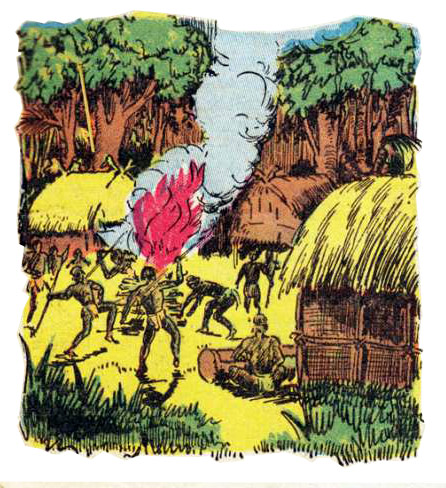
Neither of them mentioned their uppermost thoughts that their captors greatly resembled in appearance and actions the descriptions they had heard of Pacific Ocean cannibals.
Now through the opening in the hut, Bill and Sunshine saw almost all the cannibals leave the fireside and head toward the deep shadows on the other side of the clearing which indicated thick timber or even jungle. Footsteps sounded outside and again a figure came to the door, peered in. The prisoners could not see the man’s face, but both of them suddenly surged with hope and cheer as a whispered voice said: “Captain Bill! Sunshine! You here?”
“Jaragu!”
The happy whisper burst as one sound from the throats of Bill Adams and Sunshine. Instantly the form at the door came inside.
“Quiet! We must be quick!” Jaragu ordered. Meanwhile, the knife was slashing loose the tough vines which bound Bill and Sunshine. “It is strange,” Jaragu continued. “But some of their language is much similar to that used back in the Central American jungles where you found me. Perhaps we are not so far from the mainland after all.
“At any rate, two of them tried to capture me in the jungle. There was a fight. I won. When I tracked you and Sunshine, I saw in the footprints what had happened. So I painted myself, cut my hair like those I had beaten, took their weapons and came to prowl around the edge of the village.
“I was amazed to hear their language. Some of it I could understand. Enough to know . . .”
“I know,” said Captain Bill, standing and letting the blood run again through his numbed limbs. “They’re cannibals!”
Jaragu nodded and held something toward Bill, then to Sunshine. In his hands were two stone knives.
“We must act swiftly,” Jaragu warned. “Come on. Follow me.”
Turning, Jaragu swiftly slashed through the thatching at the rear of the hut, stepped out into the night. Sunshine scrambled after him, with Captain Bill bringing up the rear. They found themselves on the edge of the jungle. Glancing at the stars above, Jaragu quickly set their course and they plunged into the dense growth.
They had been travelling perhaps three or four minutes, Captain Bill reckoned, when to their ears came a series of sudden, fierce shouts.
“They’ve discovered we’re missing!” Bill exclaimed. “Hurry, Jaragu!”
A moment later they came out of the jungle onto the very edge of the cliff. Jaragu pointed.
On the beach below, dim in the moonlight, Captain Bill saw several long, slender shapes.
“War canoes and racing canoes,” Jaragu said briefly. “Come on.”
He seemed to plunge over the edge of the cliff, followed by Sunshine. Captain Bill started after them. Scrambling, sliding, plunging, the three burst forth on the beach and sprinted for the canoes.
Passing four huge, heavy war canoes, Jaragu halted beside a lighter, slender, frail craft. He seized one gunwale, Captain Bill took the other and Sunshine heaved on the stern of the canoe. It slid easily from the beach into the water.
“In!” ordered Captain Bill and continued to run through the shallow water as the others climbed aboard, reached for paddles and began to force the boat ahead.
Bill clambered aboard, gasping: “How do we get past the reef?”
“There must be a passage straight out from here,” Jaragu answered. “The savages have to get out some way.”
Twisting his head, Captain Bill in the stern of the canoe saw men dashing down the cliff side to the great war canoes. His heart sank a little, then surged as directly ahead of their own boat they saw a narrow strip of sea where the great stone reef parted.
* * * * * * *
A dozen swift thrusts of their paddles and they were racing through the opening in the barrier, just as the first of the war canoes rushed into the water from the beach.
“Now where?” Bill asked.
“Straight ahead,” came back the answer. “The other island we saw this morning. There are—white men on it!”
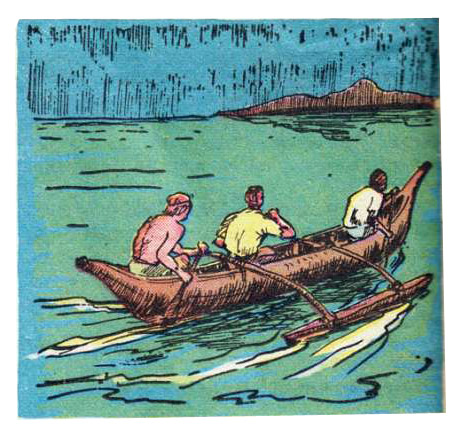
And between the driving strokes of his paddle, between gasps for breath, Jaragu sketched the outline of what he had overheard.
“There are some things I can’t understand. I don’t know enough of your—my people,” Jaragu said. “But what I heard seemed this: For many, many generations, there have been white people on this island we’re heading for. Long have these savages tried to conquer the other island. Always they have been beaten back.
“When they captured you, they saw your light skin and thought you must be one from the other island, spying on them.
“It seems one of the cannibal’s witch doctors reached the other island by swimming a few days ago. He put a slow poison into the springs from which these people drink. Now the savages are almost ready to attack once more, certain that the whites will be so ill from the poison that they will offer little fight.”
“But how could they have gotten here? Where’s their boat?” demanded Bill.
“I think they were shipwrecked in a great storm, even as we were,” Jaragu said. “The cannibals word for what the whites came here in was ‘great white winged bird.’ I guess that must mean ‘sailing boat.’ ”
“Astounding!” Captain Bill grunted. “We’ll know soon enough, though.”
Now the other island was less than a hundred yards away, and suddenly the entire beach ahead was dotted with little lights. A moment later and the lights became small fires, and then with a crackling and roar of flames, the beach front, for as far around the island as they could see, was illuminated by dozens of huge bonfires.
“They’re awake—ready for an attack!” Captain Bill exclaimed. Suddenly he sensed a new danger. The whites, thinking that the first on-rushing canoe was full of cannibals, might fire on them!
Adjusting their course, Captain Bill stood carefully in the rickety, frail canoe. He cupped his hands to his mouth, but before he could call something thudded into the side of the canoe. Looking down, the three pals saw a huge, feathered arrow, imbedded beyond its head! And the arrow had come from the island ahead!
They were caught between two fires!
* * * * * * *
Another arrow sang past his head as Captain Bill drew in breath, then shouted with a voice given strength by their predicament:
“Hold your arrows! Stop! We’re friends—not savages!”
For a second there were no signs of a response, although the arrows stopped winging their way. Then they heard a voice above the noise of the surf. “What? Are you English?”
“Americans!” Captain Bill yelled back. “We’re fleeing from the savages. Hold your fire!”
There was a moment’s silence, as if men on the beach were conferring. Then, “Bounds! It cannot be? But speed in that we may see you first!”
The three companions drove their paddles even more swiftly, but a frown gathered on Captain Bill’s face. What sort of white men were these, he wondered who spoke in such stilted, old-fashioned phrases?
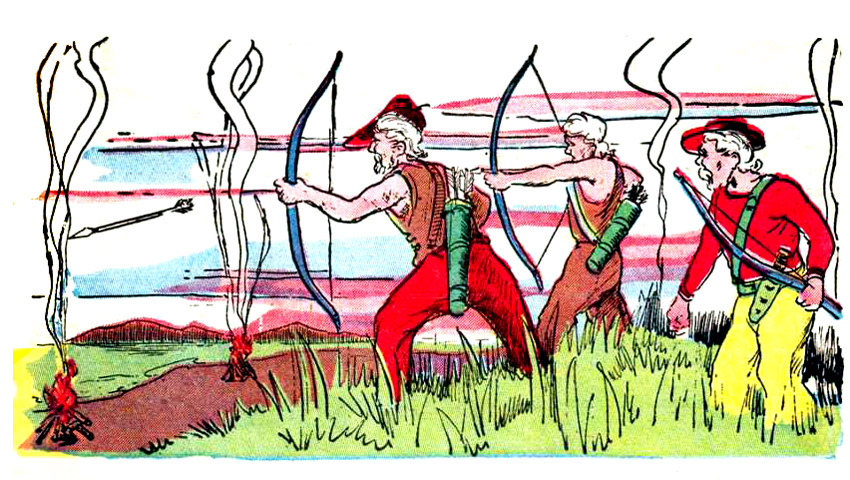
A moment later their canoe grated on the sandy beach. Instantly, as they sprang from the craft into the shallow water, they were surrounded by men, fierce rough-bearded men who held drawn bows and ready spears.
Bill stepped forward, hands held out.
“Peace!” he called. “We are shipwrecked sailors, three of us. We washed ashore on the other island. We escaped the savages and fled here. They follow us in their war canoes. Be ready.”
“Gad!” he heard someone say softly. “They speak English! They say they are Americans!”
Another voice broke in. “Welcome then, if ye be friends. Turn and join us in the fight!”
Spears were held out to the three pals. There was a moment’s confusion when the islanders saw Sunshine’s dusky complexion, but his English words and Bill’s prompt—“He’s our friend”—cleared up the difficulty.
Now, sprinting to beyond the fires, they turned and prepared to repel the savages whose war canoes, preceded by wild war shrieks, were speeding into the glare cast on the water by the fires.
Jaragu had an inspiration.
“Hold your fire,” he called to the men. “We learned they think you have been poisoned. They’ll expect little fight from you. If we wait until they leave their canoes and are in a group, our chances will be better.”
“The lad speaks truth, methinks,” came the quaintly-phrased reply from one elderly man, apparently the leader of the ragged band. “Hold arrows! Let the women bring up more spears! I shall give the command!”
For what seemed an interminable moment he waited, the others with him. Bowmen stood with half-drawn bow strings, arrows notched. Spearmen stood in front, long, pointed spears in hand, reserve spears at their feet.
A dozen or so women slipped silently forward from the shadows, dropped two additional spears beside each man. Jaragu caught a glimpse of a lithe, dark-eyed young woman as she placed extra weapons beside him. Then she was gone and he was ready, with the others, to meet the foe. At Jaragu’s side one of the ragged band of whites grunted a word of approval of Jaragu’s splendid body and hard muscles.
Then they were silent, listening to the wild shouts and screams of the onrushing savages. The black men’s four war canoes were sweeping down abreast on the beach.
Wooden prows grated on the sand. With wild bedlam the savages were over the sides, splashing through the shallows, and then the first rank touched the beach itself.
“Ready! Loose arrows!”
The patriach’s words barked loud and stern above the screaming.
Taut bow strings were released with a deep, throbbing hum. A little whisper swept through the night. And in the front rank of the on-charging savages, black men dropped on all sides.
First blood for the desperate little band!
“Spearmen! Loose spears!”
Nearly a dozen stalwart arms shot forward and slim, murderous shafts sped through the night air. Almost every man of the savages’ front rank was driven to earth by the murderous fire.
Jaragu felt an old thrill sweep through him as he reached down, grasped another spear.
Now the second wave of cannibals swept onto the beach and poured their fire of spears at the defenders. Two men dropped, wounded. But already the bowmen had nocked their second arrows and at a command from the patriarch their feathered death was loosened. Spearmen followed with a shower of spears at another command.
It was too much for the cannibals! Leaving their wounded where they fell, the survivors fled in a panic.
From the ragged little band on the beach went up a cheer.
But Captain Bill, though he had hurled his spears with the others, was not through. Cheered at having beaten off the savages, the island’s own people were willing to halt at that. But the red blood of Captain Bill Adams surged through into his head.
“Sunshine!” he roared. “Jaragu! Come on!”
And then, before the fleeing natives could leap to their paddles, Captain Bill, Jaragu and Sunshine, spears in hand, were charging into the rear guard.
Lashing out with pent-up fury engendered by the fate which the natives had planned for them, the triumvirate of adventurers wreaked havoc with the beaten cannibals.
At last, beaten and routed, the cannibals managed to drive their war canoes out into water so deep that the pursuing trio could not follow. His rage gone, Captain Bill ordered Jaragu and Sunshine to return to the beach. They splashed ashore to the loud hearty cheers of the islands defenders.
“Well fought! Well fought!”
The leader of the island’s inhabitants vouched the compliment in lusty tones. The three pals smiled happily. Now the rest of the islanders were crowding around Bill, and around Jaragu and Sunshine, demanding to know whence they came, and how; and who they were.
Laughing, Captain Bill called a halt to the questions. “Wait,” he said, “we have as many questions to ask about you as you have about us. If you have a meeting place—a cave or wherever you dwell—let’s all go there. We shall tell our stories and then you shall tell us of yourselves. Agreed?”
Joining in Captain Bill’s infectious laughter, the islanders turned and led the way up a path, leaving two men to keep a lookout on the beach and to gather again the massive piles of dry driftwood necessary for the great fires which had so effectively lighted the approaching enemy.
The trio of friends, Captain Bill, Jaragu, and Sunshine listened in amazement to the islanders’ story. The quaint-speaking people told of their fore-fathers who had lived in England at the time the colonists in America had won their independence from the mother country. They had been brave men, but rash enough to declare sympathy with the colonists. As a result, their homes had been confiscated, and they had been seized and put aboard a ship, which was to land them on some desolate unclaimed land.
A great storm arose at sea, and on the morning of August twenty-sixth, eighteen hundred and twelve, the ship was demolished upon the rocks of the island. From that day on—for more than a hundred years—the survivors of the wreck and their descendants had inhabited the island, gradually becoming sufficient unto their own needs. In all that time, no ship had ever touched the shores of the island, nor had any other white men visited them, and the islanders no longer lived in hope of being rescued.
In the morning, beneath a bright Pacific sun, Jaragu and his pals breakfasted out-of-doors on the simple fare of the island. Again Captain Bill saw the dark-eyed girl, heard another call her Patience, and watched her eyes follow Jaragu wherever the lad turned. Bill thought with a little grin of what a sensation Jaragu would be in New York—New York! The words brought him back to realities. The city was a long distance away. Hundreds of miles of open sea lay between them and even the South American coastline, which was due east if Bill’s hunch was correct.
And so, when the morning meal was eaten, Jaragu went exploring the island, Sunshine went to fish and Captain Bill, determined to work out their return to civilization, went into a conference with the islanders’ patriarch.
All morning they talked, Bill trying to construct for the leader, who was called simply Watkins, a picture of modern life.
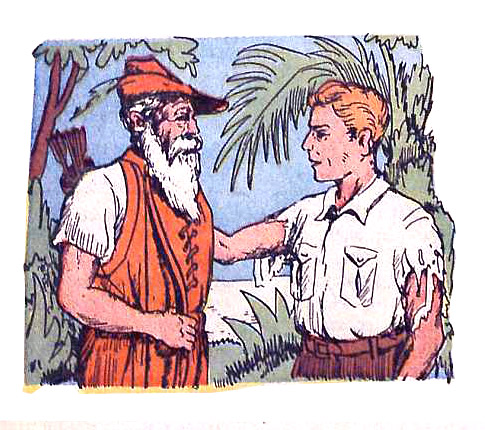
Bill noted that all the islanders bore simple English names, the heritage of those who first had been cast there. And even while he talked, Bill’s mind was racing for a solution, a way out of their difficulties.
“They will return,” the leader was saying: “They have more men than followed you here last night. There were perhaps forty warriors last night. I believe they have another dozen who did not come last night, and they will replace those who fell.
“All we can do is post vigilant guards and hope to repel them. But with nearly half our men down with the poison water fever, despite the addition of you three men, I fear we can hardly hope to repel them another time so successfully.”
But here the idea which had been turning in the back of Bill Adams’ brain suddenly took form.
“Repel them?” he asked laughing. “Give us one more night and then I hope they really will attack!”
“Why? There is nothing we can do!”
“Yes, there is. It will take an hour or two of darkness and some little risk for Jaragu and myself, but we can manage. And then let the savages attack—if they can!”
“I hope and pray so, my son,” the patriarch said solemnly, “But I doubt it. Methinks there must again be miracles come to pass in this world before we shall beat the savage back to his shores for all time.”
“I won’t tell you the plan right now,” Captain Bill admitted. “But tonight tell your guards that Jaragu and I shall be taking out the little racing canoe in which we first came here. We should be gone only a little while. If we are not back by morning—then, we . . . er . . .we won’t be back!”
Jaragu, Sunshine and Captain Bill spent the afternoon in making plans, and when the evening light began to die away, went down to the beach. Captain Bill held a short conversation with the two lookouts on the beach. When darkness finally cloaked the sea and the islands, the slender racing canoe in which the friends had escaped the cannibals’ island, slid out into the Pacific, its knife-like bow making scarcely a ripple, the paddles in the hands of Jaragu, Sunshine and Bill Adams making scarcely a whisper as they drove the craft ahead, straight for the neighboring island and the reef on which they first had been wrecked!
“This the channel?”
Captain Bill’s whisper was hoarse above the sound of the sea.
“Looks like it, suh!” came the response from Sunshine in the bow.
“Then drive ahead!”
Like a phantom through the night, the canoe slipped between the rocks, turned sharply and with their full force behind it the adventurers drove the craft northward along the shore, far above the place where the savages’ war canoes were hidden.
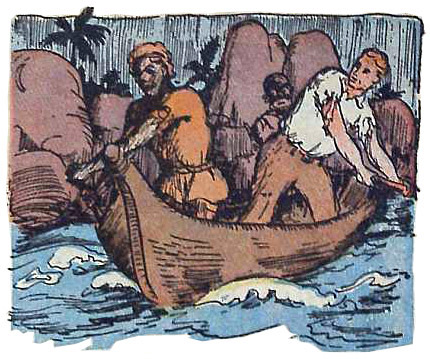
At length, signalling to Sunshine and Jaragu to halt paddling, Captain Bill swung the craft in a short arc and let its momentum carry it gently up onto the beach. Jumping out, they beached the canoe, gathered around Captain Bill for last instructions.
His voice low and firm, Bill Adams grasped each of them by the shoulder, saying:
“Remember, the canoe we’ve come in is a long way from the break in the reef. If they see us or hear us, they’ll have a mighty good chance of blocking off our escape.
“We’ve got to do the job swiftly and well. If we slip—well, there are some sixty men, women and children back there, and their only hope of ever getting out of these lost islands lies in us.
“Let’s go!”
For a moment they gripped hands. Then down the beach, taking advantage of the shadows of the cliff, they started toward the mooring place of the cannibals’ war canoes.
Once they thought they heard someone on top of the cliff, but nothing happened and they knew it had been the noise of wind and sea, echoing from the rocky bluff. When they reached a spot where they could see the bulky outlines of the war canoes in the soft night light, Captain Bill drew them to a halt.
“The reason I went ’way up the beach,” he explained, “was because they may have a guard on the canoes, following that fight. We wanted to keep him from seeing us. But now—well, we’ve got to go in and get him before he gets us or gives the alarm!”
“Dis hyah stone razor gwine to go to work!” Sunshine grunted softly. “Le’s go!”
Slipping forward, crouched and ready to sprint should they be discovered, the pals made their way toward the canoes.
A dozen feet from the boats, they flattened to death-like stillness. Ahead of them, between the first and second canoes, someone had moved!
For long minutes they were still. Finally their patience was rewarded. Above the edge of the canoe they saw the head and shoulders of a savage rise into view. And he seemed to be staring directly at them!
Bill could almost feel those eyes, burning through the darkness on him. At that moment, Sunshine sneezed!
There was a split second of startled silence in which Captain Bill Adams’ mind worked like lightning. He saw the savage suddenly stiffen, saw his spear arm go back, and thought he saw the man’s chest expand with the beginnings of a yell.
But if a shout of alarm was forthcoming from the cannibal guard of the war canoes, it never had a chance to leave his lips.
Beside Captain Bill, Jaragu moved with the speed of light itself. His arm flashed back, forward again. There was a whirring noise in the night.
From the direction of the savage guard came a dull thud, a little gasp and then, all the stiffness gone out of his muscles, the cannibal slid slowly forward across the gunwale of the nearest canoe!
“Jaragu! Just in time!” breathed Captain Bill, for he knew that the jungle youth, his training of the wilds not forgotten, had hurled a stone knife with deadly aim—and just in time!
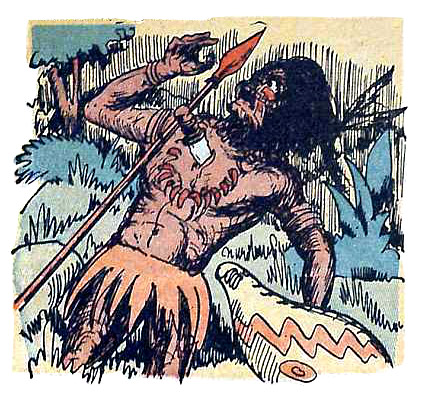
Now the three waited a moment before they moved in swift reconnoitering around the four canoes, searching for another guard. There was none.
“Right! Coast clear!” Captain Bill decided. “Jaragu, you and Sunshine go to work on those two end canoes. Fix ’em up so they won’t ever go to sea again. I see a little racing canoe here. I’ll do the same with it.”
Silently they went to work. In ten minutes stone knives had hacked through the hulls of two of the four big war canoes and through the little racing canoe’s bottom.
“Rip them out!” Captain Bill ordered. “Fix them so these savages won’t get ten feet in the water.”
Another five minutes and the job was done.
“Now,” Captain Bill ordered, “Jaragu, hurry back up the beach, smash in the little canoe that brought us but bring back the bundle wrapped up on the bottom of the canoe. Sunshine and I will try to get these two good war canoes into the water.”
Jaragu melted into the night. Tugging and heaving, prying with some of the big paddles in the canoe, Sunshine and Captain Bill managed to slide both craft down into the water. From around his waist, Bill untied a length of sturdy cord, twisted from vines, and fastened the two canoes together, prow to stern.
Now they waited for Jaragu until the sound of his hurrying footsteps sent them into the front canoe.
In another moment, the jungle youth was with them, dumping a long, bulky bundle into the canoe and clambering in to take his place at a paddle.
“Stroke! Stroke! Stroke!” Captain Bill grunted softly. In unison, the three paddles dipped into the sea, dipped again and again. But the great canoes were heavy and ponderous. They moved slowly, so slowly that at first their progress was hardly noticeable.
“Get them under way,” Bill said aloud, “and it’ll be easier going!”
And then, with a suddenness that seemed to turn their hearts up into their throats, the three pals heard the sound they most dreaded—the savage alarm cry of cannibal throats!
Bill threw a glance back over his shoulder. Dimly in the faint moonlight, he could see a horde of gleaming figures scrambling down the cliff, shouting and screaming,
“A slim chance!” Bill thought. But the opening in the reef was just ahead. Their breath coming in gasps, shoulders aching with the unaccustomed strain, Jaragu and Bill and Sunshine drove the craft the last few feet, through the hissing foam at the break in the reef and out into the sea.
“No use!” Sunshine gasped. “Cap’n Bill, it ain’ no job attall for enough ob dem boys to swim out hyah an’ surroun’ us, den jus’ lick us by there bein’ so many ob ’em!”
“He’s right, Captain Bill,” Jaragu added. “We can fight—but there are so many of them!”
Bill spared another glance toward the beach. Already the savages were leaping to the remaining two war canoes, sending them rushing into the water, leaping aboard.
Bill grinned. That was what he had been hoping for: The few precious seconds that such a mistake by the savages would give him!
“Paddle! All you’ve got!” he ordered the other two. Bill himself bent swiftly to the long bundle Jaragu had brought from the other canoe. With a stone knife he slashed the lashings around it. A swift motion and he had jammed a paddle into one end of the bundle. The other end of the paddle he lashed to one of the seats in the war canoe, tied a vine rope to the bundle.
“Sunshine! Give a hand!”
Sunshine turned, frowning as he attempted to figure out what Captain Bill was doing.
“Haul on this rope with me!”
Sunshine hauled back with a will and then, in a fluttering of thatched matting, came the answer to Captain Bill’s efforts, the answer to their means of escape from the savages . . . .
Captain Bill had brought a sail!
A makeshift sail, out of grass mattings, true. But one with enough ropes to guy it, one which could use a paddle as a mast and still catch the breeze.
Behind, they heard a new series of shouts. They saw the cannibals leaping over the sides of their canoes. Stone knives and swords gleamed in savage mouths as the natives, maddened to rage when they found their remaining craft sinking from under them, lashed out swimming in pursuit
“Paddling, we would have been overtaken!” Captain Bill admitted, tying fast the last rope. “But now—watch!”
A few more feet of drifting and then they were out from the lea of the island. The breeze filled the matting out gently, tugged at it with greater force. Swiftly, the canoe with a sail towing the other, the strange procession headed for the Lost Island.
“I noticed the prevailing wind was from the east,” Bill explained in answer to Jaragu’s and Sunshine’s unspoken but implied questions. “And here we are. Look, the savages have seen it. They’re turning back.”
He was right. Already the pursuing swimmers were giving up, returning to their island.
“Now, for the Lost Island and a night of putting food and ropes and matting aboard these canoes,” Bill said at last “Tomorrow, we’re taking the lost people home!”
And so it was that in the morning, straight into the rising sun, a strange band aboard strange craft headed eastward.
Some ten feet apart, but lashed in tandem by bamboo spars, were the two war canoes. Straight up from the center of the connecting spars rose a bamboo mast, cut and fitted by flares in the night
Three thatched mattings were roped to the, mast, with spars lashed to each. They were square sails. One could not tack or maneuver well with them, but by sailing in daylight, when the winds were from the west, and by rowing at night when the wind came from the east, Captain Bill Adams knew that it would be no more than five or six days at the most before they touched somewhere on the mainland of the American continent.
Women, men, children and youths, the poisoned and the well—all the little island’s gallant band—were divided in the two canoes. They had provisions enough for two weeks; they had their spears and knives and bows and arrows; they had fishing lines.
It was a gamble, but if the weather was anything less than of hurricane violence—and perhaps even that—they would make it. Captain Bill knew those things.
And so, standing at the stern as the sails bellied in the wind, Captain Bill saw Jaragu side by side with the comely young islander who had brought him weapons that wild night; saw, too, the look of new hope in the faces of the lost people; saw, as they passed the eastern island, the frantic, maddened dancing of the boatless savages upon the shore; saw fade into the Pacific Blue the lost island.
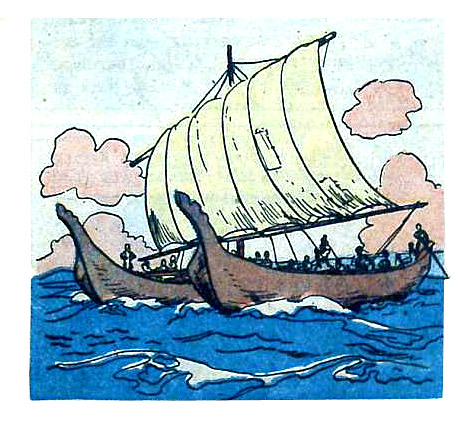
“Home,” Captain Bill murmured. “We’re going home.”

This site is full of FREE ebooks - Project Gutenberg Australia